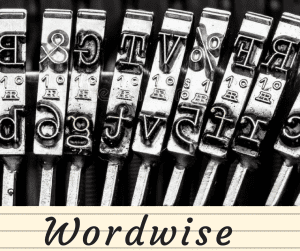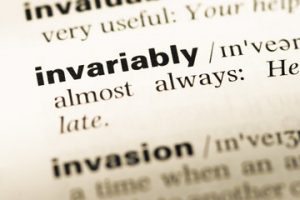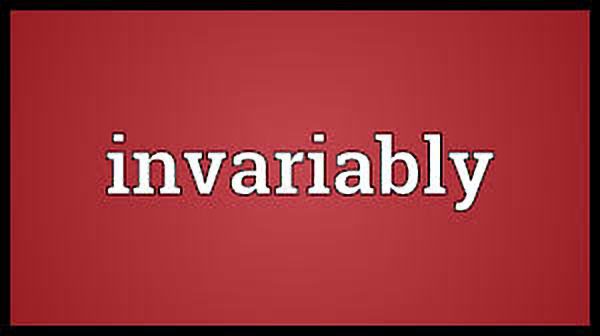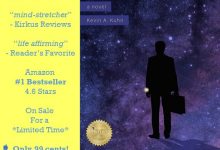Sushmita examines the nuances of the word, invariably, exclusively for Different Truths.
 Invariably, hyphen comes out, reveals itself as that welcome hole through which light comes in a dark room… and serves as the light too, presenting the wholeness of that which is seen in its light! So, repeatedly does it come up for acknowledgment, deserving every bit of it, as disserving not, rather, serving with delight the hidden nuances in and of words, bringing to the fore the “forefathers” (could be the “mother” and the “father” too!) of the words.
Invariably, hyphen comes out, reveals itself as that welcome hole through which light comes in a dark room… and serves as the light too, presenting the wholeness of that which is seen in its light! So, repeatedly does it come up for acknowledgment, deserving every bit of it, as disserving not, rather, serving with delight the hidden nuances in and of words, bringing to the fore the “forefathers” (could be the “mother” and the “father” too!) of the words.
“Invariably,” as I had been using this word, carried the implications of “more often than not” and “generally”: “Invariably he does that…” “Invariably it happens…” Never did I even think of approaching the dictionary for the meaning of invariably, as, we, almost invariably, behave as “copycats,” finding it easier to eat and serve what has been on the platter and the menu consistently.
But life, inevitably and unavoidably, prods us to enquire… abets the curiosity and satiates it, curiosity ever having its reason, never unreasonable. The causative provocation and evocation are assured and ensured, life insuring us against its non-realization.
Thus, I was made to court the query (and a nagging one at that), as to why invariably means what it means… how it came into being… and dragged out is the satiation, the answer actually easing out! Yet again, my friend, hyphen [1], waves and extends its hands, as it reveals itself, well-ensconced within the word …
Invariably reveals itself as: “In-variably!”
Invariably further clarified itself, with and as a specific synonym: “In-varyingly.”
To you all, it might be obvious. But to me, it wasn’t, till it was. Invariably further clarified itself, with and as a specific synonym: “In-varyingly.” In that moment of  startling clarity, I realised, how inadvertently I had been deploying this word, almost advertising it, whenever the implied was “generally” and “usually.” It was never an in-depth assessment — in fact, never a moment accorded to ponder whether that, that I was describing, was actually invariant. The thought actually never occurred to enquire… Having heard it many times and as a frequent utterance, kind of sensed the implied and so was it propagated, never fully comprehending, unaware that I was unaware. Yet, that too is the beauty of life, engaging in its childlike play of hide-and-seek! Life never invariant, ever in motion, and hence in a state of constant change — self-perpetuating, self-sustaining, self-realising… adapting constantly, evolving continuously, even if mostly imperceptibly — hides its nuances to deliver with the rapture of the found, whether unsought or sought consciously.
startling clarity, I realised, how inadvertently I had been deploying this word, almost advertising it, whenever the implied was “generally” and “usually.” It was never an in-depth assessment — in fact, never a moment accorded to ponder whether that, that I was describing, was actually invariant. The thought actually never occurred to enquire… Having heard it many times and as a frequent utterance, kind of sensed the implied and so was it propagated, never fully comprehending, unaware that I was unaware. Yet, that too is the beauty of life, engaging in its childlike play of hide-and-seek! Life never invariant, ever in motion, and hence in a state of constant change — self-perpetuating, self-sustaining, self-realising… adapting constantly, evolving continuously, even if mostly imperceptibly — hides its nuances to deliver with the rapture of the found, whether unsought or sought consciously.
Concurrently, as every coin has two sides, this revelation led to another query: How accurate is the description, expression, “invariably,” when the only constant is, change? The existence of invariably is felt to be questioned.
The moment we deem something as invariable, we redeem limitedness, while, acknowledging the variability, variations galore are enjoyed, limitlessness is realised and relished, albeit only after facing many contrasting and contradicting appearances which are ultimately transcended, the affirmations unveiled and felt in them.
Life is eternal, and life is for evolution eternal, as is a matter of infinite-realisation. Life is; hence, evolution is.
 We know that, and hence, we agree also: We generalise at our peril, as is a folly, we jolly well know. We ourselves have proven that time and again. Also has been proven that this defiance, when it rears its head to generalization, is natural, given that nothing in life is invariant… nothing is constant, barring change, however bizarre they might initially appear to be. Life is eternal, and life is for evolution eternal, as is a matter of infinite-realisation. Life is; hence evolution is. And as evolution is, since life is, hence, nothing is invariable in life. Life is energy in perpetual motion, and energy can neither be created nor destroyed, rather, it transforms and thus conserves itself eternally (as says the Law of Conservation of Energy, presented by Albert Einstein).
We know that, and hence, we agree also: We generalise at our peril, as is a folly, we jolly well know. We ourselves have proven that time and again. Also has been proven that this defiance, when it rears its head to generalization, is natural, given that nothing in life is invariant… nothing is constant, barring change, however bizarre they might initially appear to be. Life is eternal, and life is for evolution eternal, as is a matter of infinite-realisation. Life is; hence evolution is. And as evolution is, since life is, hence, nothing is invariable in life. Life is energy in perpetual motion, and energy can neither be created nor destroyed, rather, it transforms and thus conserves itself eternally (as says the Law of Conservation of Energy, presented by Albert Einstein).
Given these truths, are we ready to acknowledge: “Invariably,” inevitably, has to give in to “in-variably,” with change being the “invariant,” as everything is changing constantly, “in-varyingly?” Even the words, their construction and their meanings, promote and embrace change. Thus we give credence to neologism, neologism giving credence to, and arising out of that credence to, the coining of new words and expressions[2].
Even the words, their construction and their meanings, promote and embrace change.
Are we ready to acknowledge that we are “in,” on Earth, as “variable” mass and energy forms, to give form to many unique forms of mass, energy, manifestations of the unique energy, creativity that we are? These myriad creations are called forth, they materialise, as we realise our mission, sole, constant, “in-variable”: Realisation, which proceeds, in-variably, as and through evolution. Are we ready to accept that we are “in,” as unique “variables,” “variably” varying, as our perception varies, evolves, in-variably?
In the acceptance resides an in-variable calm and charm, which, too, evolves, in-varyingly! In realising the potential and beauty in variable — realised through the constant variability, constant change — lies the unbridled joy of realising the solely invariable!
Note: The subject of the article, and a bit of its content, forms part of a forthcoming book.
[1] http://www.differenttruths.com/literature/criticism/hi-friend-hyphen/
[2] https://www.dictionary.com/browse/neologism
©Sushmita Mukherjee
Photos from the Internet





 By
By


 By
By